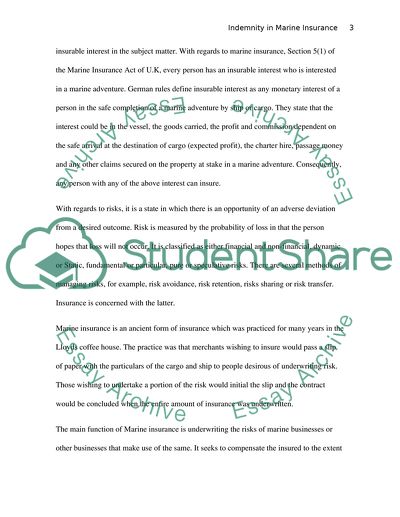Cite this document
(Indemnity in Marine Insurance Assignment Example | Topics and Well Written Essays - 1500 words - 5, n.d.)
Indemnity in Marine Insurance Assignment Example | Topics and Well Written Essays - 1500 words - 5. https://studentshare.org/finance-accounting/1591308-the-main-function-of-marine-insurance-is-to-compansate-the-insured-for-loss-or-damage-caused-by-the-risk-insured-against-in-many-case-the-compansation-by-the-insurers-takes-the-form-of-indemnity-what-do-you-understand
Indemnity in Marine Insurance Assignment Example | Topics and Well Written Essays - 1500 words - 5. https://studentshare.org/finance-accounting/1591308-the-main-function-of-marine-insurance-is-to-compansate-the-insured-for-loss-or-damage-caused-by-the-risk-insured-against-in-many-case-the-compansation-by-the-insurers-takes-the-form-of-indemnity-what-do-you-understand
(Indemnity in Marine Insurance Assignment Example | Topics and Well Written Essays - 1500 Words - 5)
Indemnity in Marine Insurance Assignment Example | Topics and Well Written Essays - 1500 Words - 5. https://studentshare.org/finance-accounting/1591308-the-main-function-of-marine-insurance-is-to-compansate-the-insured-for-loss-or-damage-caused-by-the-risk-insured-against-in-many-case-the-compansation-by-the-insurers-takes-the-form-of-indemnity-what-do-you-understand.
Indemnity in Marine Insurance Assignment Example | Topics and Well Written Essays - 1500 Words - 5. https://studentshare.org/finance-accounting/1591308-the-main-function-of-marine-insurance-is-to-compansate-the-insured-for-loss-or-damage-caused-by-the-risk-insured-against-in-many-case-the-compansation-by-the-insurers-takes-the-form-of-indemnity-what-do-you-understand.
“Indemnity in Marine Insurance Assignment Example | Topics and Well Written Essays - 1500 Words - 5”. https://studentshare.org/finance-accounting/1591308-the-main-function-of-marine-insurance-is-to-compansate-the-insured-for-loss-or-damage-caused-by-the-risk-insured-against-in-many-case-the-compansation-by-the-insurers-takes-the-form-of-indemnity-what-do-you-understand.


